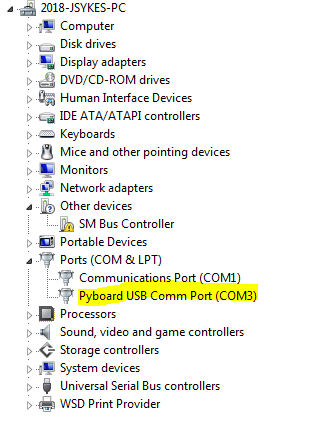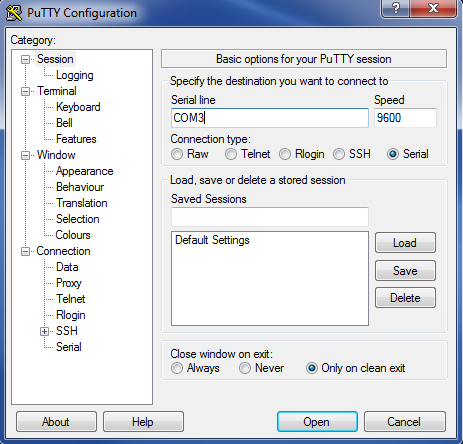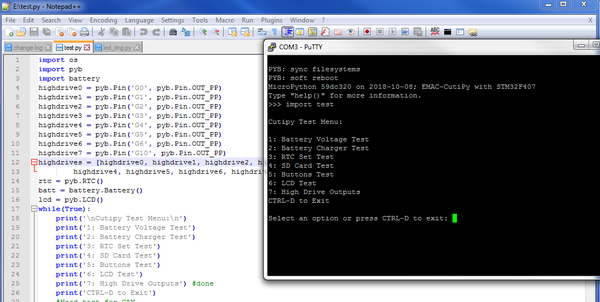Difference between revisions of "Cutipy Getting Started"
| (5 intermediate revisions by 2 users not shown) | |||
| Line 25: | Line 25: | ||
2. Open your preferred serial monitoring program: | 2. Open your preferred serial monitoring program: | ||
| − | *On Windows use | + | *On Windows use PuTTY: https://www.putty.org/ |
*On Linux or Mac use Minicom | *On Linux or Mac use Minicom | ||
| Line 55: | Line 55: | ||
<!-- /*********************************************************************************************************/ --> | <!-- /*********************************************************************************************************/ --> | ||
{{:Templateimpl:using | initials=BS | title=Developing with the Cutipy | desc=The following page can be used to get familiarized with Micropython the Cutipy. | project=OE 5.0 }} | {{:Templateimpl:using | initials=BS | title=Developing with the Cutipy | desc=The following page can be used to get familiarized with Micropython the Cutipy. | project=OE 5.0 }} | ||
| − | 1. Using your choice of text editor / IDE, you can write [[ | + | 1. Using your choice of text editor / IDE, you can write [[ Micropython | Micropython ]] scripts. |
| − | |||
2. From there, they can be loaded onto the Cutipy by simply moving the python file to the PYBFLASH directory. | 2. From there, they can be loaded onto the Cutipy by simply moving the python file to the PYBFLASH directory. | ||
| Line 67: | Line 66: | ||
{{:Templateimpl:whatnext | initials=BS | title=Getting Started with the EMAC OE SDK | desc=Basic tutorial for using the EMAC OE SDK. | project=OE 5.0 }} | {{:Templateimpl:whatnext | initials=BS | title=Getting Started with the EMAC OE SDK | desc=Basic tutorial for using the EMAC OE SDK. | project=OE 5.0 }} | ||
| + | |||
| + | [http://git.emacinc.com/micropython-public/micropython-doc CutiPy Micropython Documentation] | ||
| + | |||
[[ Cutipy_Test | Cutipy Test Software ]] | [[ Cutipy_Test | Cutipy Test Software ]] | ||
| + | |||
| + | [[ Cutipy-MicroPython Bluetooth LE demo | Cutipy-MicroPython Bluetooth LE demo ]] | ||
[[ Micropython | Micropython ]] | [[ Micropython | Micropython ]] | ||
| + | |||
| + | [[CutiPy-Installing_MicroPython_Firmware | CutiPy-Installing Micropython Firmware]] | ||
Revision as of 17:56, 18 October 2019
This page outlines a basic guide to getting starting using the Cutipy.
Contents
General Information
Tools Required
- Desktop PC (Windows/Linux/Mac will work)
- Mini-USB to USB Cable
Setup
1. Connect the Cutipy to your PC using the Micro-USB to USB cable.
2. Open your preferred serial monitoring program:
- On Windows use PuTTY: https://www.putty.org/
- On Linux or Mac use Minicom
3. Create a terminal Session with the board:
- On Windows:
- Open device manager, right click on the new device, and click 'Update driver software'.
- Browse for 'pybcdc.inf' which should be on the Cutipy (It will show up similar to a USB thumb drive, the directory will be called PYBFLASH), select this file.
- The device should now show up under 'ports'.
- Open PuTTY and select a ‘Serial’ connection type and enter the Comm Port shown on your ‘Device Manager’.
- On Linux/Mac:
- Figure out which tty your device is connected to (Most likely /dev/ttyACM0). You can do this by running 'dmesg -w' and then plugging in the board.
- Follow these instructions to set up minicom. When setting the 'Serial Device', enter the port you found in the step above.
4. You should now have a REPL session open with the Cutipy. This is identical to a typical Python3 CLI interface.
Developing with the Cutipy
1. Using your choice of text editor / IDE, you can write Micropython scripts.
2. From there, they can be loaded onto the Cutipy by simply moving the python file to the PYBFLASH directory.
3. Run these files by simple typing "import filename" in the REPL session.
Pages with Related Content
CutiPy Micropython Documentation


